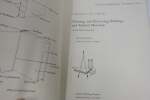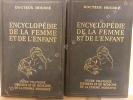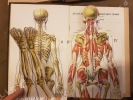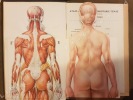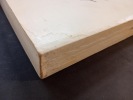-
Type
Book (808)
Drawings (13)
Magazine (8)
Object book (1)
-
Latest
Last 3 days (2)
Last month (9)
-
Language
English (5)
French (823)
Japanese (2)
-
Century
17th (2)
18th (7)
19th (55)
20th (388)
21st (67)
-
Countries
Belgium (86)
Canada (1)
China (4)
Côte d'Ivoire (1)
Denmark (2)
France (710)
Greece (1)
Switzerland (25)
-
Syndicate
ALAC (1)
ILAB (279)
NVVA (3)
SLACES (3)
SLAM (272)
SNCAO (1)
Le Décor des Soieries d'Art Anciennes et Modernes. Documents originaux en couleurs du Musée historique des Tissus de Lyon.
Paris, Editions Nilsson, sans date, 1 volume grand in-folio de 420x310 mm environ, non paginé (24 pages), 56 planches en couleurs montées sur onglets reproduisant des documents emblématiques des collections du Musée des tissus de Lyon, demi basane racinée fauve, titres dorés. Petites rousseurs sur les pages de gardes, des épidermures et traces noires sur le cuir, frottements sur le cartonnage, sinon bon état.
Henri d' Hennezel (1874-1944). Hommes de lettres - Directeur du Musée Historique des Tissus de la Chambre de Commerce de Lyon. Merci de nous contacter à l'avance si vous souhaitez consulter une référence au sein de notre librairie.
Musée Historique des Tissus. Catalogue des principales pièces exposées
Chambre de Commerce de Lyon, Société anonyme de l’Imprimerie Rey 1929 In-4. Broché, couverture rempiée imprimée, XIII-136 pp., 16 planches contenant 31 illustrations. Exemplaire non coupé en bon état.
440 notices. Bon état d’occasion
MUSEE HISTORIQUE des TISSUS : CATALOGUE des PRINCIPALES PIECES EXPOSEES
Un ouvrage de 136 pages, format 210 x 260 mm, illustré de 16 planches contenant 31 illustrations, broché, publié en 1929, Impr. A. Rey (Lyon), très bon état (non coupé)
Concerne le Musée des tissus de Lyon
Phone number : 04 74 33 45 19
In Search of Cultural Identities in West and Central Asia. A Festschrift for Prudence Oliver Harper
, Brepols, 2024 Paperback, 444 pages, Size:216 x 280 mm, Illustrations:111 b/w, 171 col., 0 tables b/w., 1 maps b/w, 4 maps color, Language: English. ISBN 9782503604381.
Summary How do we reconstruct ancient societies' cultural and visual identities? Prudence Oliver Harper has dedicated her scholarly and curatorial career to piecing together the material culture of communities across ancient Western Asia, Iran, and Central Asia. A number of her colleagues - art historians, archaeologists, philologists, and conservators - have contributed essays to this volume to reflect Harper's range of contributions throughout her six-decade career. Many of the essays focus on ancient metalwork, Harper's major expertise, while others on glyptics, ivory, or glass, three of her other interests. The essays aim to make sense of this region's diverse cultural identities, many of which are the results of cross-cultural exchange. Some authors have employed iconographical or socio-historical approaches; others have complementarily opened new facets of cultural identities through technical and scientific analyses, collection history, and provenance research. TABLE OF CONTENTS Kim Benzel (The Metropolitan Museum of Art) Foreword Judith A. Lerner (Institute for the Study of the Ancient World), Betty Hensellek (independent scholar) and Henry P. Colburn (New York University) Prudence Oliver Harper: Curator and Scholar Judith A. Lerner and Henry P. Colburn Bibliography of Prudence Oliver Harper Materials and Methods Matteo Compareti (Capital Normal University, Beijing) Textile Decorations in Sasanian Stucco Panels at Bandyan (Khorasan, Iran) Georgina Herrmann (Institute of Archaeology, University College London, Emerita) Bringing Order Out of Chaos: Connoisseurship as a Fundamental Tool Pieter Meyers (Los Angeles County Museum of Art, Emeritus) Bronze Casting in the Near East and Surrounding Areas St John Simpson (The British Museum) Sasanian Skeuomorphs: the Influence of Metalware on the Glass Industry K. Aslihan Yener (The Oriental Institute, University of Chicago, Emerita; and Ko University, Emerita) Silver for Justinian: Lead Isotope Analyses of Sixth- and Seventh-Century Silver Artifacts Sasanian and Sogdian Silver Betty Hensellek (Cornell Institute of Archaeology and Material Studies) The Many Lives of the Silver Saiga Rhyton in the Metropolitan Museum of Art Kate Masia-Radford (Independent Scholar) Aquatic Imagery on Silverware Attributed to the Sasanian Period Asadullah Souren Melikian-Chirvani (Independent Scholar) The Enduring Memory of Iranian Antiquity in Islamic Iran Nicholas Sims-Williams (School of Oriental and African Studies, Emeritus) and Bi Bo (Renmin University, Beijing) A Silver Vessel with a Sogdian Inscription from Chach Mediterranean and Central Asian Connections Joan Aruz (The Metropolitan Museum of Art, Emerita) and Annie Caubet (Mus e du Louvre, Emerita) Central Anatolia and the Mediterranean: Art and the Materials of Interaction Henry P. Colburn (New York University) On the Date and Cultural Context of Aurel Stein's Gilgit Rhyton Anca Dan (Centre national de la recherche scientifique, and cole Normale Sup rieure, Paris) and Frantz Grenet (Coll ge de France, Paris) Facing Dionysus at Silenus' Banquet in Tokharistan: A Possible Echo of a Greco-Roman Mystic Circle on a Fourth-Fifth Century "Bactrian" Silver Bowl in The al-Sabah Collection (LNS 1560M) Judith A. Lerner (Institute for the Study of the Ancient World) Thoughts on a Reused Roman Seal with a Middle Persian Inscription Andrew Oliver (Independent Scholar, Washington, D.C.) Fishing among the Flowers on a Roman Silver Cup Holly Pittman (University of Pennsylvania) Forerunners of Old Elamite Culture in Bronze Age Kerman Karen S. Rubinson (Institute for the Study of the Ancient World) Once More Identity at Tillya Tepe: the Iron Artifacts from Burial 2 History and Historiography Carol Bier (Center for Islamic Studies, Graduate Theological Union, Berkeley; The Textile Museum, Emerita) Professor Pope and Dr. Phyllis Ackerman: Carpets and the Study of Persian Textiles Martha L. Carter (Independent Scholar) Notes on the Creative Mind of Ardashir I John E. Curtis (Iran Heritage Foundation; The British Museum, Emeritus) and Vesta Sarkosh Curtis (The British Museum) A Statue from Hatra in the Basrah Museum Anne Dunn-Vaturi (The Metropolitan Museum of Art) Marie-Th r se Dubalen and the Ancient Near Eastern Study Collection Rika Gyselen (Centre national de la recherche scientifique, Paris, Emerita) Yazd, une province de l'empire sassanide Jens Kr ger (Museum f r Islamische Kunst, Emeritus) Revisiting the Ctesiphon Excavations of 1928-29 and How the Met's Trustees Saved the Second Campaign in 1931-32
Material differences. Art and identity in Africa.
New-York, Museum of African Art, 2003 Bound, yellow cloth with dustjacket, 179pp., 30.5x23.5cm., ills. in col., new. ISBN 9789053494585.
Why are certain materials chosen to create specific works of art? Material Differences is an exhibition that proposes answers to that question. This exhibition examines the extensive range of materials used in the creation of African art and reveals the inherent relationships between the materials, their significance as media, artistic techniques, and the role of artists. nThe use of a wide range of different materials plays a major role in the creation of African art works. The choice may be religious, economic or socially motivated. Some materials are ephemeral, while others are chosen to last for generations. The exhibition walkthrough is organized according to the type of materials used, technique, and artistic processes. Starting with the ephemeral, visitors discover artworks created from materials such as fibers, mud and feathers, which literally disintegrate or are purposefully destroyed after their ritual use. nThe next section introduces materials such as wood, ivory and stone, distinguished by the subtractive process of sculptors. Wood carving techniques are explored through the inclusion of various tools, finished and unfinished objects, and the treatment of the surface through patination and paint. The significance of ivory will also be examined. Ivory, derived from hippopotami and elephants, and therefore associated with physical and emotional strength, is associated with royalty or leadership of an elevated social level. Kings and chiefs associate character traits, such as physical and mental strength, with animals, like hippos and elephants, from which the ivory is obtained.
Soieries. Illustrations de E. Cochard
Archat, Syndicat des fabricants de soieries et tissus de Lyon 1937 In-4 31 x 24 cm. Agrafé, couverture à rabats, premier plat avec report auteur et titre en lettres noires et orné des armoiries dorées de la vile de Lyon, 15 pp., portrait de édouard Herriot en frontispice et 4 illustrations en couleurs sous frontispice. Pied et tête de dos effrangés, sinon bon exemplaire.
Bon état d’occasion
Soieries. Illustrations de E. Cocard
Lyon, Archat, Syndicat des fabricants de soieries et tissus de Lyon 1939 In-4 31,5 x 24,5 cm. Broché, dos muet, couverture ivoire à rabats, 15 pp., en frontispice portrait de édouard Herriot, maire de Lyon, 4 planches en couleurs sous serpentes hors texte. Accroc en pied de dos.
Bon état d’occasion
KILTS ET TARTANS
Paris Librairie Hachette 1964 in 8 (21,5x20,5) 1 volume reliure cartonnée de l'éditeur, plat supérieur illustré en couleurs, 126 pages [1], avec de nombreuses illustrations en noir et blanc et en couleurs, dont hors-texte. Texte français de Claude Pagani. Collection ''Plaisir en images''. Bel exemplaire
Très bon Couverture rigide
Histoire du tailleur de Baghdad et du secret merveilleux.
Draeger 1 Montrouge, Draeger, (1910), in-8 carré, br., couv. ill. en coul. ouvrage rassemblé s/s le n°3000980 pr. cata. 302.
Conte Oriental parodiant les "Mille et une nuits" ill. par R. VINCENT, R. LELONG, PREJELAN, KOWALSKY pour les hors-texte en coul. et Foa pour les dessins de mode. Lègers trous et griffures.
HIGH LIFE TAILOR. BARBIER (George). LELONG (René). FAIVRE (Abel).
Reference : 17656
(1921)
Danses de jadis.
Paris Draeger 1921 1 Montrouge, Draeger, 1921, in-4 (27 x 21 cm), broché, couverture illustrée en couleurs, 12 pages.
Catalogue de mode présentant, à travers les époques, les différents styles d'habits de danse, en Grèce, en Inde, sous Louis XV, à la Renaissance, et en Chine. Couverture de George BARBIER. Petit pli et taches.
HIGH-LIFE-TAILOR. BOULENGER (J.). BOUTET DE MONTVEL (Bernard).
Reference : 314
(1909)
Le Chic et les Dandys.
Paris DEVAMBEZ 1909 1 Paris, Devambez, 1909, in-16, broché, couverture imprimée, (40) pp.
Elégant livret traitant du dandysme et de la réponse proposée par High-Life-Tailor. Illustrations de BOUTETde MONVEL, MATHIEU, FERRO... Restaurations à la couverture.
La Mysterieuse affaire de la formule. P., Draeger, 1911, in-8 carré, br., couv. ill. en coul.,12 pp.
1
Catalogue de mode ill. par FOA sur fond d'intrigue policière avec Sherlock Holmes et Charlie Chan. De belles illustrations h.-t accompagnent ce récit avec une belle couv. de MARCHETTI.
La Journée d'une Parisienne au XXè siècle.
Paris DRAEGER 1923 1 in-8 Paris, Draeger, 19236, in-8, broché, couverture illustrée en couleurs.
Le raffinement, la grâce et l'élégance d'une Parisienne, habillée par le couturier H.L.T., tout au long de la journée. Petites usures à la couverture, piqures et infimes taches.
Nos artistes donnent leur opinion sur la toilette de la femme à notre époque.
Paris HIGH LIFE TAILOR 1 P., Maquet, ( 1911). In-4, br., couverture décorée d'un médaillon gauffré en couleur, illustré de quatre planches en couleur et d'une gravure sur bois en noir, 12 pages.
Editée par et pour "High Life Taylor", cette brochure regroupe quatre modèles d'artistes (BOUTET de MONVEL, SABATTIER, LAURENT, LELOIR) et un texte critique de ces derniers sur la mode contemporaine. Usures, piqures et déchirures à la couverture planches détachées.
méthode de coupe et de confection pour vêtement de femmes et d’enfants
revue et augmentée d’un cours de couture en blanc et d’une méthode de tricot à l’usage des écoles,des familles et des ateliers.In 12 broché,faux-titre,frontispice,titre avec vignette, 297 pages,non coupé,catalogue Hetzel de 34 pages en fin de volume.Nombreuses illustrations dans le texte. Bibliothèque d’éducation et de récréation J.Hetzel sans date mors inférieur droit fragile
"HODKINSON, EATON. - A PIONEER WORK ON THE STRENGHT OF MATERIALS.
Reference : 42912
(1840)
Experimental Researches on the Strenght of Pillars of Cast Iron, and other Materials. received April 22, - Read May 14, 1840.
(London, Richard and John E. Taylor, 1840). 4to. No wrappers as extracted from ""Philosophical Transactions"" 1840 - Part II. Pp. 385-456 a. 3 lithographed plates (one folding). Clean and fine.
First printing of an influential paper in structural mechanics.""In 1840, Hodkinson presented his investigation on buckling of columns to the Royal Society (the paper offered). His purpose was to verify the theoretical formula of Euler...Cylindrical, solid and hollow specimens with rounded and flat ends were tested. Foer slender, solid struts, good accord was found with Euler's formula...It was also found that a strut with flat ends has the same strenght as a shorter strut og half its lenght which has rounded ends.""""Hodkinson baceme the professor of mechanical principles of engineering in University College, London, in 1847, and, during his tenure of the chair, he participated as a member of teh Royal Commission appointed to inquire into the application of iron to railway structures. In 1841 Hodgkinson was awarded a Royal Medal for his work on strenght of pillars and, in the same year he was elected a Fellow of the Royal Society.""(Timoshenko ""History of Strenght of Materials"", p. 128-29). - Darmsatedter, 1840 H.
Examen pratique des TEINTURES et des IMPRESSIONS sur les TEXTILES. traduit de l'édition néerlandaise et adapté par H. de Leeuw.
P. et Liège, Librairie Polytechnique Ch. Béranger, 1939, in 8° broché, VIII-78 pages ; non coupé ; 12 pages de publicités sur papier vert en début de volume ; quelques rousseurs ; couverture fanée.
PHOTOS sur DEMANDE. ...................... Photos sur demande ..........................


Phone number : 04 77 32 63 69
Cleaning and Preserving Bindings and Related Materials
Paperback, 108 pages, very good condition: slight stains of moisture almost harmless, otherwise perfect condition. Black and white illustrated book.
Encyclopédie de la femme et de l'enfant. Guide pratique d'hygiène et de médecine de la femme moderne (2 volumes)
1955 Editions Argentor - 1955 - 2 volumes fort in-8, cartonnage de l'éditeur - 901 + 852 pages - Très nombreuses reproductions photographiques et illustrations en couleurs et en N&B
Bon état
L'Epopée de la fourrure.
1945 1 Montreal, Édition de l'arbre, 1945, in-12, broché, couverture crème, titre en noir et rouge.
Un des 15 exemplaire hors-commerce numéroté sur papier Japon Impérial. Exemplaire N°I. Ouvrage historique traitant le sujet de la fourrure en trois parties : les découvertes de la côte Nord-Ouest d'Amérique, le traité des pelleteries et les grandes compagnies de fourrures américaines.
Diamonds and Bars. The Art of the Amish People / Die Kunst der Amischen.
Stuttgart, Arnoldsche, 2007. Grand in-4, cartonnage d’éditeur ill. sous jaquette en couleurs, 213 pp. (texte bilingue allemand-anglais), ill. en couleurs, 74 notices. Bibliogr., index.
Etude sur les décors géométriques des patchworks Amish, depuis l’ère victorienne jusque dans les années 30. Jaquette un peu salie, bon état intérieur. Hardcover, dust jacket slightly soiled. Good condition. - Frais de port : -France 8,45 € -U.E. 13 € -Monde (z B : 23 €) (z C : 43 €)
Amish the art of the quilt
Alfred A. Knopf, Callaway 1990 In-folio reliure éd. sous jaquette 36 cm sur 36 et étui.. Livre en anglais. Édition originale. 207 pages. Bon état d’occasion.
Bon état d’occasion
Le langage des tissus
Patrick Hugues 1982 In-4 broché 29,6 cm sur 20,8. 464 pages. ATTENTION : ouvrage touché par l’eau. Couverture légèrement passée et poussiéreuse, dos plié, taches dans le coin inférieur gauche et supérieur gauche du premier plat, dernier cahier en partie détachée, intérieur frais. État correct d’occasion.
139 illustrations, 8 planches hors-texte en couleurs Etat correct d’occasion
TISSUS ET TRAVAIL DE CIVILISATON
Rouen Editions Médianes 1996 in 8 (24,5x17) 1 volume broché, 336 pages [4], avec des illustrations, dont hors-texte en couleurs. Préface d'Yves Bonnefoy. Très bel exemplaire ( Photographies sur demande / We can send pictures of this book on simple request )
Très bon Broché
Grand livre des Monogrammes (Le)
Le Temps Apprivoisé - DMC 2000 In-4 broché, couv. illustrée en couleurs, 160 pp. Photos en coul + 676 tracés et 676 grilles de point de croix. Etat neuf. Poids : 1,1 kg avec emballage d’expédition.
Alphabet complet de monogrammes pour tous les éléments nécessaires à la décoration : couronnes, fleurs, noeuds, chiffres et alphabets pour personnaliser vos créations. En fin d’ouvrage, des explications pour réaliser peintures, gravures et broderies de différents styles ou des modèles plus insolites comme la piqûre sur papier ou le collage de boutons. Très bon état d’occasion
 Write to the booksellers
Write to the booksellers










